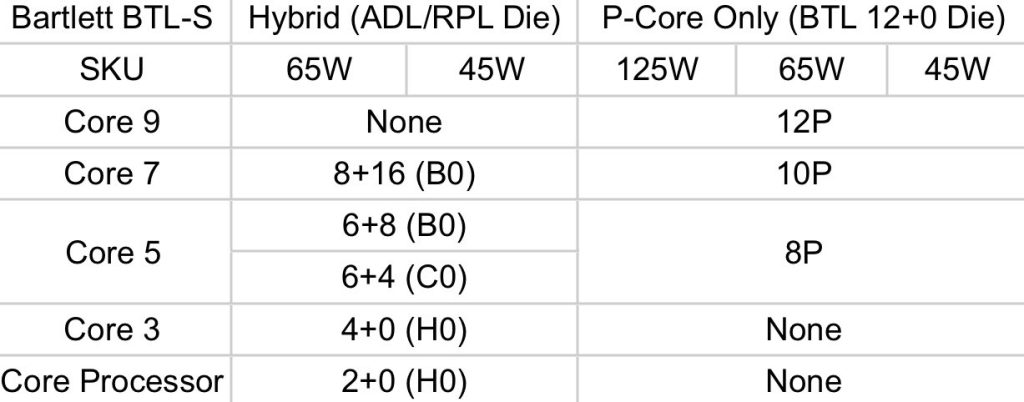Although Arrow Lake-S is just a few months away from release, it's not the only new desktop architecture Intel is launching in the next year or so. Contrary to earlier expectations, it looks like Intel wants to extend LGA1700 support for a few more years with Bartlett-S SKUs.
Initially targeted for network and edge applications, the Bartlett-S architecture will reportedly be available for general consumers, as Jaykihn shows in his X post. If the information is accurate, then Bartlett-S SKUs will be divided into five levels to meet specific customer needs. The line-up will include a Core 9 variant with 12 P-Cores and no E-Cores, available in TDP categories of 125W, 65W, and 45W. Core 7 and Core 5 are also expected.

Image credit: Jaykihn
The Bartlett-S series may also feature Alder Lake (ADL) and Raptor Lake (RPL) dies with configurations similar to existing 12/13/14th Gen Core processors. These Alder/Raptor Lake dies won't include any Core 9 SKU, as the 24-core variant that was once exclusive to it will be accessible as a Core 7 SKU. Core 3 and Core processors are also expected to be released. The table shows these will also feature Alder/Raptor Lake dies, but unlike the others, they'll only have P-cores.
According to the report, these new processors will be launching in 2025.
Discuss on our Facebook page, HERE.
KitGuru says: AMD extended support for the AM4 platform in recent years, even releasing new Ryzen 5000 series chips after the launch of Ryzen 7000. Now, it appears Intel may try a similar strategy with Raptor Lake/Alder Lake and the LGA1700 socket.
 KitGuru KitGuru.net – Tech News | Hardware News | Hardware Reviews | IOS | Mobile | Gaming | Graphics Cards
KitGuru KitGuru.net – Tech News | Hardware News | Hardware Reviews | IOS | Mobile | Gaming | Graphics Cards


